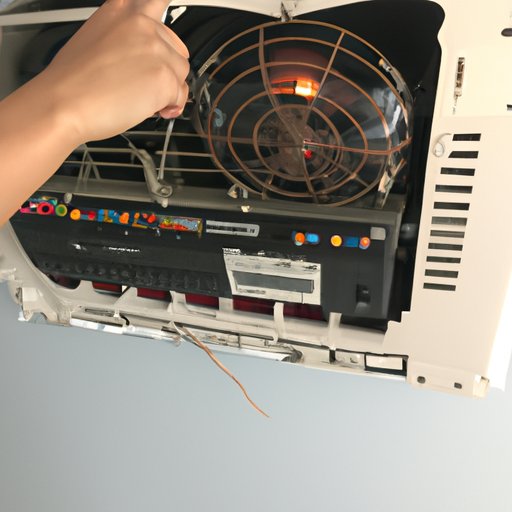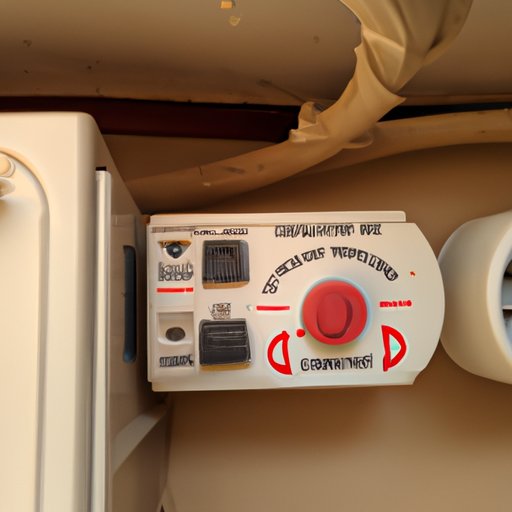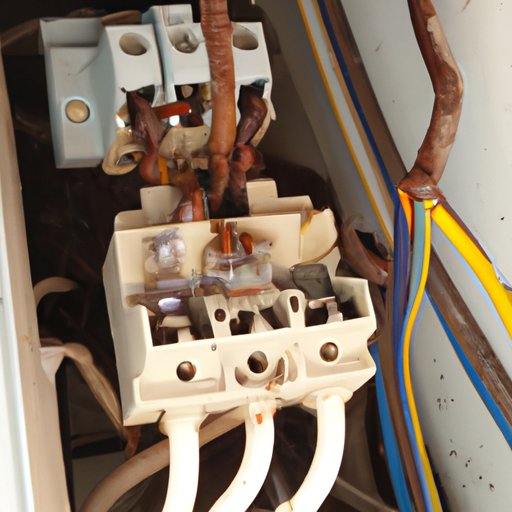Introduction
An AC breaker is an electrical device that is designed to protect the wiring in your home from becoming overloaded, damaged, or even worse, causing a fire. When too much electricity passes through a circuit, the breaker will trip and shut off the power. It’s important to understand why your AC breaker may be tripping and how to identify and fix the problem, as well as how to prevent it from happening in the future.
Exploring the Causes of an AC Breaker Tripping
There are several possible causes for an AC breaker to trip, including:
Short Circuit or Ground Fault
A short circuit occurs when a hot wire touches a neutral or ground wire, creating a direct path for electricity to travel, resulting in large amounts of current flowing through the circuit. This can cause the breaker to trip. A ground fault is similar, but occurs when a hot wire comes into contact with the ground, allowing electricity to flow freely.
Overloaded Circuit
If too many appliances are plugged into the same circuit, this can cause the circuit to become overloaded, resulting in the breaker tripping. According to the National Electrical Code, a 15-amp circuit should not have more than 12 amps of load on it.
Corrosion
Corrosion can occur on the terminals of the breaker, which can cause the breaker to trip. Corrosion can also form on wires, which can increase resistance and cause the breaker to trip.
Loose Wiring/Connections
Loose wiring or connections can cause the breaker to trip. This can be caused by loose wires in the circuit, or loose connections at the breaker panel.
Overheating Components
Components such as motors or transformers can become overheated, causing the breaker to trip. This can be caused by overloading the circuit, or by a failing component.
How to Identify and Troubleshoot an AC Breaker Problem
If you suspect that your AC breaker is tripping, there are a few steps you can take to identify and troubleshoot the problem:
Check the Circuit Breaker Panel
The first step is to check the circuit breaker panel. Look for any signs of corrosion or loose connections. If the breaker has tripped, reset it and see if the problem persists.
Inspect the Wiring
Look for any signs of damage or overheating on the wiring. Check for any loose connections or broken wires. Make sure all of the connections are tight and secure.
Test the Voltage
Using a voltage tester, check the voltage on the circuit. If the voltage is higher than normal, this could indicate a short circuit or ground fault.
Check for Overheating
Check for any signs of overheating on the wiring or components. This could be caused by an overloaded circuit or a failing component.

What to Do When Your AC Breaker Keeps Tripping
If your AC breaker keeps tripping, there are a few things you can do:
Reset the Breaker
If the breaker has tripped, the first step is to reset it. This will allow the circuit to reset and hopefully solve the problem.
Replace the Breaker
If the breaker continues to trip, it may need to be replaced. This should only be done by a qualified electrician.
Upgrade the Wiring
If the wiring is old or outdated, it may need to be upgraded. This should also be done by a qualified electrician.
The Dangers of Ignoring a Frequently Tripping Breaker
It’s important to address an AC breaker that is frequently tripping, as this can be a sign of a serious problem. Ignoring a tripping breaker can lead to several dangers, including:
Fire Risk
Overloaded circuits or faulty wiring can cause a fire. If the problem is not addressed, it could result in a fire.
Electrical Shock Risk
Faulty wiring or loose connections can cause an electrical shock. If the problem is not addressed, it could result in an electrical shock.

Tips for Avoiding a Tripping AC Breaker
To avoid a tripping AC breaker, there are a few steps you can take:
Install GFCI Outlets
GFCI outlets are designed to protect against electrical shock. They detect imbalances in the electrical current and will shut off the power if necessary.
Don’t Overload Circuits
Make sure not to overload a circuit by plugging in too many appliances. This can cause the circuit to become overloaded, resulting in the breaker tripping.
Use Surge Protectors
Surge protectors can help protect against sudden increases in voltage, which can cause the breaker to trip.
Properly Rated Breakers
Make sure all of the breakers in your panel are properly rated for the circuit they are connected to. This will help to ensure that the breaker does not trip due to an overload.

Common Reasons Why an AC Breaker May Trip
There are several common reasons why an AC breaker may trip, including:
Short Circuit or Ground Fault
A short circuit or ground fault can cause the breaker to trip. This can be caused by a hot wire coming into contact with a neutral or ground wire.
Overloaded Circuit
Plugging too many appliances into the same circuit can cause the circuit to become overloaded, resulting in the breaker tripping.
Corrosion
Corrosion can occur on the terminals of the breaker, as well as on the wires, which can cause the breaker to trip.
Loose Wiring/Connections
Loose wiring or connections can cause the breaker to trip. This can be caused by loose wires in the circuit, or loose connections at the breaker panel.
Overheating Components
Components such as motors or transformers can become overheated, causing the breaker to trip. This can be caused by overloading the circuit, or by a failing component.
Conclusion
Understanding why your AC breaker may be tripping and how to identify and fix the problem is important. If your AC breaker keeps tripping, it’s important to address the issue as soon as possible, as ignoring the problem can lead to a variety of dangerous situations. Taking steps to avoid a tripping breaker, such as installing GFCI outlets and using surge protectors, can help to prevent the problem from occurring in the future.
(Note: Is this article not meeting your expectations? Do you have knowledge or insights to share? Unlock new opportunities and expand your reach by joining our authors team. Click Registration to join us and share your expertise with our readers.)
